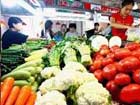| Videos | ? Latest |
|
? Feature | ? Sports | ? Your Videos |
Vegetable prices soaring in China

The prices of basic necessities, like fruit and vegetables are on the rise in China. And Beijing is no exception to the trend. So how much have costs increased, and how much is it affecting Chinese people?
One can live without fancy clothes or owning a car. But one just cannot live without food, especially vegetables.
But now, the price of vegetables is getting out of hand. The increase is troublesome to Li Xi. She is a new college graduate and works in a state-owned enterprise. She used to buy vegetables in supermarkets, but now buys them in a wholesale market.
She says its cheaper here. And she says if she spends more money to eat, she will have less money to buy clothes and cosmetics, which are quite normal demands for a city girl. She will also not have enough left over to purchase books or pay for some social activities which are common for many youngsters.
But is this issue that serious? How much has the price actually increased?
Liu Tong, Department of Statistics of Beijing Vegetable Wholesale Market said "By the end of October, the price of cabbage has risen 10 percent. The price of other vegetables spiked 50-percent compared to last year."
Liu Tong says vegetable prices normally fluctuate, but sometimes they can not fully explain the price increase. Once the vegetable price is pushed to new levels, with other products getting more expensive, it can no longer get back down to its previous level.
It is natural that the more expensive vegetables become, the more money their seller will earn. But do they?
One vegetable seller said "No, we earn more or less the same or even less than before, and my production costs are higher. Fertilizer, pesticides, and transportation are no longer as cheap as they used to be."
In recent years, China has been increasing the amount and categories of agricultural subsidies, but it has not reduced the production cost of agricultural products.
According to the Beijing Bureau of Agriculture, vegetable prices hit a daily record high of 3 Yuan per kilogram in the capital. And if the money in our pockets is worth less and price of other products keeps soaring, there is little hope that the price of vegetables will fall down.
The affordability of vegetables to ordinary people, especially those in low income groups, can be seen as a reflection on the management of the industries that control and balance supply and demand. It should have been trivial to decide which kind of vegetables to eat, but now, it is an issue that matters.
 0
0 






